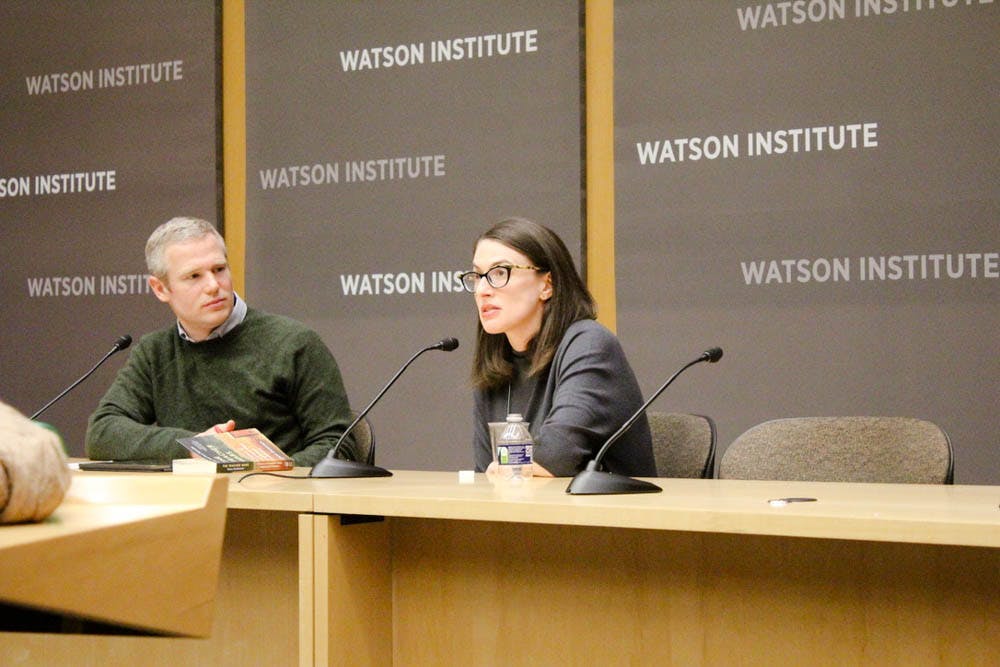Dana Goldstein ’06, a national correspondent for the New York Times, discussed the impact of education policies on students, parents and teachers nationwide at the Joukowsky Forum Monday afternoon.
Attended by students, faculty and community members, the talk was moderated by Matthew Kraft, associate professor of education and economics, and sponsored by the Annenberg Institute for School Reform and the Watson Institute for International and Public Affairs.
Goldstein joined the Times in 2017 and is the author of the bestselling book, “The Teacher Wars: A History of America’s Most Embattled Profession.”
A “journalism nerd” from a young age, Goldstein started a newsletter for her third grade class. Growing up in a white, upper-middle-class family in Westchester, New York, Goldstein participated in a desegregation program as a child and was bused to a school outside of her district. At Brown, she concentrated in history and was a writer and editor for The Herald, where she said she learned how to be a journalist from the many late nights she spent on production.
The talk touched upon a range of issues within the American education system, such as school funding, integration in schools and improving the teacher workforce.
Citing the growing inability of teachers to own homes in the communities they teach in, Goldstein described teachers as “vanguards” of economic inequality in America. “Teachers were sold a vision of their life, which is (that) they would be solidly middle class,” she said. They expected “they’d be the type of people who could afford a home, get a pension, retire and be comfortable. That’s not the deal that teachers of the millennial generation and younger (generations) are getting.”
On the issue of school integration, Goldstein discussed efforts in San Francisco and other cities across the country that grant parents the choice to send their kids to schools outside their neighborhoods. But she said this flexibility of choice has resulted in a complex system that rewards upper-middle-class parents who have the time and resources to tour different schools and fill out related forms. “They created a system that is supposed to lead to equity but is in fact more deeply segregating,” Goldstein said.
The talk was also attended by one of Goldstein’s former professors at the University, Senior Lecturer Emeritus Luther Spoehr, who taught her in his class EDUC 1200: “History of American School Reform.” Although Spoehr has taught the class for over 20 years, he said they were still discussing the same issues in 2019 as they were in 1996. Looking for optimism, Spoehr asked Goldstein if there is reason to be hopeful about anything in the system.
Goldstein responded that she is optimistic because, compared to a few years ago, teachers are more respected. But because she knows education is cyclical, she said she expects there to be more backlash in the future. “I’m not a starry-eyed optimist,” she admitted. “I don’t think many reporters are. I don’t think it’s a profession that truly attracts optimism.”
Goldstein also discussed her experience as a journalist in a polarized political climate where some people are highly critical and skeptical of the media. She recalled one incident where she was tasked with interviewing a person who was a ringleader in the effort to remove the word “democracy” from Michigan social studies classes. Since the person espoused Trumpian, anti-media ideas on his social media, Goldstein assumed he would not want to speak to the Times. Instead, she found a person eager to talk to a Times reporter for an hour and have his picture taken.
Still, Goldstein believes that among the politicians who spout this anti-media rhetoric, they are generally “deeply resentful” of a media they perceive as cosmopolitan and with a liberal agenda.
Andrea Mazie, a parent of Providence public school students, is on a community design team tasked with making recommendations for changes in a school district that has been failing for decades. Mazie asked Goldstein for factors she has seen as crucial in differentiating good schools from bad schools.
“Principals are incredibly important,” Goldstein answered, adding that they must be dynamic leaders of both kids and parents and must have a clear vision for instruction.
Mazie said that while she wasn’t looking for a “silver bullet” answer to her question, Goldstein’s response resonated with her and was consistent with a conversation Mazie had with a teacher just earlier that day.
“She just knows a ton,” said Mazie, who wishes she could bring Goldstein into meetings she has with her community design team. Mazie said that there are a lot of knowledgeable faculty members at Brown who she believes are insufficiently engaged within the community, either due to lack of awareness or motivation. “If there’s good stuff to know about how to evaluate teachers better and how to align it with not just test scores … I would like to hear that from somebody who thinks about that for a living.”





